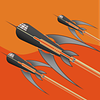Take a photo of a barcode or cover
4,5*
What a wonderful book!
It's taken me a while to pick it up, but after re-reading the BELGARIAD and MALLOREON series for the third (fourth?) time, I decided I wanted to read its two companion pieces as well. I started with POLGARA and... wow. It's been an incredible ride. I thought I wouldn't like this book as much as I do the original series, because it doesn't have all the characters I've come to know and love (aside from Polgara, Belgarath, and a handful of others). I found myself falling in love with all the new characters throughout the story, however.
Polgara's story is a long and complicated one, starting in her mother's womb before she and Beldaran are even born. It tells of her relationship with her mother and her twin sister, the animosity she feels towards her father and her ongoing relationship with him, the way she finally loses Beldaran (multiple times, in several ways), and the way she learns about her gift and how to use it. Her time in Arendia is covered thoroughly and I loved reading about her time in Vo Wacune, keeping the Arends in check, and being the Duchess of Erat. The story is told in such a way that I could almost feel my heart break every time something terrible happened, showing how awful it can really be to have a lifespan as long as Polgara's.
Of course, the fact that she watches over the Rivan line - her sister's line - is also an important plot element. We find out what it was like for Polgara to raise so many little boys, to keep them hidden and take care of them as she waited for the Godslayer to be born. The final part, leading up to Garion's birth and briefly afterwards, was beautiful and so sad at the same time. So many bad things happen in Polgara's story, but there are also so many wonderful things.
I really felt myself drawn into this story and although it dragged ever so slightly a couple of times, it was never for long. It's quite action-packed, in a way, so each time I started feeling like nothing much was happening, something did happen that had me on the edge of my seat again. A beautiful companion read to the BELGARIAD and the MALLOREON. I'll be picking up Belgarath's story next!
What a wonderful book!
It's taken me a while to pick it up, but after re-reading the BELGARIAD and MALLOREON series for the third (fourth?) time, I decided I wanted to read its two companion pieces as well. I started with POLGARA and... wow. It's been an incredible ride. I thought I wouldn't like this book as much as I do the original series, because it doesn't have all the characters I've come to know and love (aside from Polgara, Belgarath, and a handful of others). I found myself falling in love with all the new characters throughout the story, however.
Polgara's story is a long and complicated one, starting in her mother's womb before she and Beldaran are even born. It tells of her relationship with her mother and her twin sister, the animosity she feels towards her father and her ongoing relationship with him, the way she finally loses Beldaran (multiple times, in several ways), and the way she learns about her gift and how to use it. Her time in Arendia is covered thoroughly and I loved reading about her time in Vo Wacune, keeping the Arends in check, and being the Duchess of Erat. The story is told in such a way that I could almost feel my heart break every time something terrible happened, showing how awful it can really be to have a lifespan as long as Polgara's.
Of course, the fact that she watches over the Rivan line - her sister's line - is also an important plot element. We find out what it was like for Polgara to raise so many little boys, to keep them hidden and take care of them as she waited for the Godslayer to be born. The final part, leading up to Garion's birth and briefly afterwards, was beautiful and so sad at the same time. So many bad things happen in Polgara's story, but there are also so many wonderful things.
I really felt myself drawn into this story and although it dragged ever so slightly a couple of times, it was never for long. It's quite action-packed, in a way, so each time I started feeling like nothing much was happening, something did happen that had me on the edge of my seat again. A beautiful companion read to the BELGARIAD and the MALLOREON. I'll be picking up Belgarath's story next!
adventurous
dark
emotional
funny
mysterious
slow-paced
Plot or Character Driven:
Character
Strong character development:
Yes
Diverse cast of characters:
Yes
Flaws of characters a main focus:
Complicated
Awash in sexism, with a liberal sprinkling of racism, this story follows the titular character as she bullies her way through history. The only redeeming feature of this terrible book is the last few pages of the last chapter (not the forgettable epilogue), and that is only for the nostalgia. I remember enjoying the Belgariad and the Mallorean years ago (although a recent reread of the former shows that it doesn't hold up well), but this is not staying in my collection. It's headed straight for a used bookstore to see if they'll take it. Very disappointing.
Originally published on my blog here in September 1998.
Polgara the Sorceress is the second prequel to the Belgariad and Malloreon series. The different author attribution of this and Belgarath the Sorcerer apparently reflects not a change in how David Eddings' books are written, but is more an overdue acknowledgement. The story of the world of Belgarath and his family now occupies twelve books, though the two prequels match in length any two of the others.
The first prequel tells a first person narrative of the life of [b:Belgarath the Sorcerer|189802|Belgarath the Sorcerer|David Eddings|http://photo.goodreads.com/books/1320458538s/189802.jpg|938087], 'the Eternal Man'; this second one is the same, courtesy of his daughter, Polgara. There is naturally some overlap (as Belgarath has been alive through the whole of his daughter's life), but they concentrate on different aspects of the history of the Eddings' world.
Even though they come first chronologically, the prequels would not be a very interesting read before the remainder of the series. The place to start is with the first volume of the Belgariad, [b:Pawn of Prophecy|44659|Pawn of Prophecy (The Belgariad, #1)|David Eddings|http://photo.goodreads.com/books/1320440039s/44659.jpg|2558293] (which was published first). If you enjoy that series and the Malloreon, then come back to the two prequels. (Their scene-setting introductions follow on after the end of the main series.)
Myself, I would be pleased to see the Eddings abandon the arch tone that they take in the whole series, and which is particularly annoying in the prequels. There is a distinct sentimental vein to David Eddings - I once read an interview in which he referred to [a:Tolkien J. R. R.|5493564|Tolkien J. R. R.|http://www.goodreads.com/images/nophoto/nophoto-U-50x66.jpg] rather nauseatingly as "Papa" - but he is able to jettison it when he desires to do so. His contemporary novels, [b:High Hunt|110691|High Hunt|David Eddings|http://photo.goodreads.com/books/1223645532s/110691.jpg|2834150] and [b:The Losers|110689|The Losers|David Eddings|http://photo.goodreads.com/books/1171643524s/110689.jpg|106674], are much better written because in them he assumes a rather different style which works well. To sum up, Polgara the Sorceress is probably for fans only.
Polgara the Sorceress is the second prequel to the Belgariad and Malloreon series. The different author attribution of this and Belgarath the Sorcerer apparently reflects not a change in how David Eddings' books are written, but is more an overdue acknowledgement. The story of the world of Belgarath and his family now occupies twelve books, though the two prequels match in length any two of the others.
The first prequel tells a first person narrative of the life of [b:Belgarath the Sorcerer|189802|Belgarath the Sorcerer|David Eddings|http://photo.goodreads.com/books/1320458538s/189802.jpg|938087], 'the Eternal Man'; this second one is the same, courtesy of his daughter, Polgara. There is naturally some overlap (as Belgarath has been alive through the whole of his daughter's life), but they concentrate on different aspects of the history of the Eddings' world.
Even though they come first chronologically, the prequels would not be a very interesting read before the remainder of the series. The place to start is with the first volume of the Belgariad, [b:Pawn of Prophecy|44659|Pawn of Prophecy (The Belgariad, #1)|David Eddings|http://photo.goodreads.com/books/1320440039s/44659.jpg|2558293] (which was published first). If you enjoy that series and the Malloreon, then come back to the two prequels. (Their scene-setting introductions follow on after the end of the main series.)
Myself, I would be pleased to see the Eddings abandon the arch tone that they take in the whole series, and which is particularly annoying in the prequels. There is a distinct sentimental vein to David Eddings - I once read an interview in which he referred to [a:Tolkien J. R. R.|5493564|Tolkien J. R. R.|http://www.goodreads.com/images/nophoto/nophoto-U-50x66.jpg] rather nauseatingly as "Papa" - but he is able to jettison it when he desires to do so. His contemporary novels, [b:High Hunt|110691|High Hunt|David Eddings|http://photo.goodreads.com/books/1223645532s/110691.jpg|2834150] and [b:The Losers|110689|The Losers|David Eddings|http://photo.goodreads.com/books/1171643524s/110689.jpg|106674], are much better written because in them he assumes a rather different style which works well. To sum up, Polgara the Sorceress is probably for fans only.
adventurous
medium-paced
Strong character development:
No
Loveable characters:
Yes
Diverse cast of characters:
No
adventurous
challenging
emotional
funny
hopeful
inspiring
lighthearted
mysterious
reflective
sad
tense
fast-paced
Strong character development:
Yes
Loveable characters:
Yes
Diverse cast of characters:
Yes
Flaws of characters a main focus:
Yes
adventurous
relaxing
slow-paced
Plot or Character Driven:
A mix
Strong character development:
Complicated
Loveable characters:
Complicated
Diverse cast of characters:
No
Flaws of characters a main focus:
Yes
It's the story of her life up to Pawn of Prophecy by Polgara and mostly I liked the voice, except for the sexism and racism. You'd think that someone who had lived several lifetimes would have learned that there are a lot of things men and women have in common and that some women are different to others and not all women and not all [insert race here] are the same. Yes it's easy for someone who has lived a long time to become very ingrained in their thinking but she's done so much stuff and with wolves a lot of the time the female is the leader. It's lazy.
Still it was interesting to revisit my teenage years, I wonder how well the original series would live up to re-reading or would it really annoy me.
Still it was interesting to revisit my teenage years, I wonder how well the original series would live up to re-reading or would it really annoy me.
And so the Belgariad saga comes to an end. Sure, there's the Rivan Codex, but that doesn't take the story any further. Polgara is the crowning jewel of the series, and my favourite.
The Belgariad saga is my comfort reading, my problematic fave. Eddings was the first fantasy author I read, and he (or they, rather) holds a special place in my heart. I know it's full of tropes, and shallow, and the characters are caricatures and one-note. I don't care.
Last year was very difficult for me, and I plucked Pawn of Prophecy off my shelf in desperation during a very dark time. I needed the comforting familiarity of this series, the happy ending, the banter. They helped pull me through.
The Belgariad saga is my comfort reading, my problematic fave. Eddings was the first fantasy author I read, and he (or they, rather) holds a special place in my heart. I know it's full of tropes, and shallow, and the characters are caricatures and one-note. I don't care.
Last year was very difficult for me, and I plucked Pawn of Prophecy off my shelf in desperation during a very dark time. I needed the comforting familiarity of this series, the happy ending, the banter. They helped pull me through.
While better than Belgarath the Sorcerer, it really is just a fill-in-the-blanks of what went on before the main series began. However, there is much more depth behind Polgara's portrayal of events. While Belgarath's is more of a list of everything that happened, Polgara's provides some new perspective, introducing new characters and plots we haven't seen before. Particularly, her time in Arendia was actually an interesting story as it was neither covered in the main series nor in Belgarath's book, and it was nice to get some more insight into her relationship with Beldaran.
Overall, were these two books necessary? No, but I enjoy reading them at the end of every reread of the two main series, as it's a nice cap on everything that occurs in those.
Overall, were these two books necessary? No, but I enjoy reading them at the end of every reread of the two main series, as it's a nice cap on everything that occurs in those.






